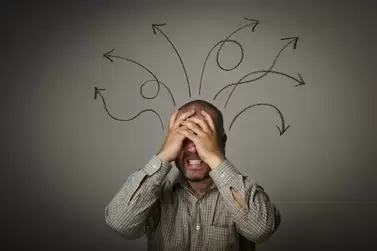How To Build Self-Kindness: 4 Best Exercises and Tips You know that little voice in your head? The one that tells you that you are not doing good enough and won’t amount to anything. The one that tells you that you are the only one who doesn’t know what they are doing? Basically, that little voice that tells you that you are just not good enough and a failure. I have got a voice like that too. I like to call it my inner critic. Most, if not all of us, are more unkind to ourselves than those around us. Can you imagine saying things like “you are not good enough” to those around you? If we did, I doubt we would have anyone be okay with such statements, let alone stick around. So why is it that we are so harsh with ourselves? And, how can we become our very own friends? Let's find out!
0 Comments
What is Emotional Flooding? 4 Ways to Cope and Stop It Have you ever been in a situation where it felt like your emotions sat in the driver’s seat and took hold of the wheel? That all your sense of reasoning ended up in the back seat? We have all been there at some point in our lives. We have all experienced this out-of-control feeling of not being able to set those feelings aside and letting it consume us. In today's article, we explore what emotional flooding is, what causes it, and how to stop it from happening. The Real Self-Care Guide for Busy Women: 10 Ways to Practise While self-care is an important practice for everybody, busy women are a group that is especially vulnerable to neglect their own mental and physical wellbeing. Societal expectations of women, hustle culture, and guilt are some of the unique challenges that the modern woman faces and which prevents her from engaging in healthy self-care. Lack of self-care can lead to a host of negative consequences and mental problems. As a result, today we bring the ultimate self-care guide for our busy women that are giving their all. Burnout vs Depression: What’s The Difference & How To Recover Feel like you can’t take it anymore? Like your life is too much to handle? Is sleeping all you want to do all day? If yes, you might be experiencing something within yourself that isn’t quite right. Most often, this can be a sign of depression or burnout. But how can you tell the difference between the two?  If you are reading this, there’s a chance that you might be an empath. Even though we all feel a certain level of empathy, an “empath” is someone who connects and identifies intensely and easily with other people and stimuli. Fear of Getting Old: What is Gerascophobia & How To Cope Our society is obsessed with youth. It is only necessary to look at the booming, billionare anti-ageing industry to understand the length of our obsession with appearing young. It comes as no surprise that many of us struggle with a deep-seated fear of aging. The fear of getting old is all too common and can fuel our anxiety and disrupt our mental health. That is why we want to share with you what psychology has to say about the fear of aging, and, most improtantly, discuss how to cope with this fear so that we can live more fulfilling and self-compassionate lives. How Mindfulness Affects Our Brain and Body: 6 Proven Benefits With over 2 billion (!) results coming up on a quick google search, it’s safe to say that mindfulness has officially entered public consciousness. It seems it’s not just a hippie-weed-consuming-kind of thing anymore (was it ever, though?) but a lot of people still seem to believe that its effects and benefits are only for the mind, not the body. How To Deal with a Perfectionist: 5 Examples and Tips Perfectionists are all around us and their unsolicited advice can wear us down. Think, for example, about those people that keep commenting about which work suits us most, how we should parent our children, how we should dress, or how we should clean our house. Why is it that the perfectionists in our lives can affect our wellbeing? And, how can we manage the perfectionists that surround us? Today we will find out. What is a Therapy Dog? 10 Ways They Improve Our Wellbeing If you are reading this article, chances are you like animals, correct? If you not only like animals, and dogs specifically, you might also have a pet yourself or have grown up around pets. If so, you also probably know that pets have some skills that allow them to provide us with an immense amount of support, love, and above all - acceptance. And, if you’re following our content here at Antiloneliness, you might recognize these topics as part of therapy as well. Well, you’re not the only one. How to Practice Mindfulness at Work: 5 Easy Tips The workplaces can be extremely competitive and stress-provoking environments. Long working hours, strict deadlines, difficult conversations with bosses and managers can be hard sometimes. Also, the amount of information you are bombarded with can increase your anxiety levels and can make you feel overwhelmed and disconnected from the present time. The tricky part of this bad habit is that it can easily turn into a vicious cycle. The moment you start feeling anxious, you disconnect from the present time and start focusing on future tasks or past mistakes at the workplace. In the end, it causes more anxiety, provokes stress and might cause burnout. In the long run, it can affect both your mental and physiological health. So, it is important to deal with your stress level adaptively and decrease anxiety. What can you do about this? This is where mindfulness comes in.
The Stress Cycle: How To Manage Stress The Right Way We have all been through stressful periods in our lives. For example, moving to a new country, changing jobs, or breaking up with a partner. We are all acquainted with the feeling of stress and know a couple of things about how to manage it. The problem is that we have come to believe that once we are done with a stressful experience, that’s it; we are done and do not need to do anything else. This can't be farther from the truth so today we will explore what psychologists know about managing stress the right way. We will discuss what the stress cycle is and why is it so important to complete it. Are Perfectionists Truly Confident? The Perfectionism Paradox When we meet a perfectionist we oftentimes see the image of a perfect person that is confident and has everything figured out. We tend to think that they are very successful, that they have their life together and are under control. Unfortunately, if you delve deeper into the mind of a perfectionist, you will soon realize that this is not true. Today we will uncover the paradox of perfectionism. Whether you are eager to learn more about perfectionism or you are a perfectionist yourself, I hope this article provides you with some valuable insights. What is People-Pleasing & Why Is It So Difficult To Stop? We all know a people-pleaser. These sorts of people can be very kind, helpful, and all around enjoyable to share time with. However, what lurks below the surface are deeply self-sabotaging tendencies that can harm the mental health of the pleasers. If you are a people-pleaser, chances are that you have tried to change your habits and mindset to no avail. Why is it that it is so difficult to stop people-pleasing? And, how is it that something so seemingly positive as pleasing others can become harmful? Let's find out. Workaholism 101: Common Symptoms, Causes and Tips When someone asks how can they stop overworking, what they often hear is to 'simply work less or set some boundaries'. Evidently, this can help but it is not as easy and straightforward as it sounds. The truth is that there are some deeper reasons to why it is so difficult to stop being a workaholic. For instance, we might know that stopping working on a project at five is reasonable. But, we might still be compelled to work well into the night. Why is it that some of us seem addicted to work? And, how can we overcome this? Practicing Self-Compassion: 20 Phrases for Difficult Moments Imagine your best friend going through a tough period in their life: they just got fired from their dream job, and they believe they are completely incapable of anything. “I am so useless and stupid! I cannot do anything right!”, they tell you. And now think: how would you react? You likely see yourself rushing to your friend’s side: you comfort them, support them. You tell them that many people feel this way after losing their job. You try to reassure them and tell them that they are being too harsh on themselves. But now imagine that this “best friend” is you. Would you do the same to yourself? We would probably all like to imagine doing the same for ourselves, but the reality is usually a little bit different than that. Many of us find it easier to be there for others than to be there for ourselves when times are tough: it feels easier and more acceptable for us to be compassionate to others than to show that compassion for ourselves. But what is self-compassion anyways? Is Perfection Possible? Tips to Overcome Perfectionism As perfectionists, we tend to think that perfection is in fact something that is attainable and feasible. However, life is not that simple. The idea of perfection might just be something that solely exists in our heads, and this idea is ever-changing. One day we might think that perfection means getting our dream job, but when we actually get this job, it might not be what we wished for. So, we change our goals, and once again try to strive for this abstract concept of perfection. And, the never-ending strive for perfection continues. So, let's back up and ask ourselves: is perfection even possible? And, if it is not, then why do we try so hard to achieve it? What is Negative Thinking? 10 Tips to Break the Cycle We all think negatively. We all have moments where the world is not fair and everything is against us. However, when we allow ourselves to do it too often, things can go downhill. In this article, we will discuss what negative thinking entails, why do we engage on it, and 10 ways to stop the cycle of negative thinking. The Gut Feeling: What Is It & Should You Follow It? When was the last time you had this gut feeling about something? Did you listen to it or did you dismiss it? My guess is that quite a few people know what it is like to have a gut feeling but then decide to "rationalise it away" with logic. Given what we know about how our brain developed differently from other species - it may seem like the "logical" thing to do, right? Why Is It Hard to Practice Self-Compassion?
Perfectionism and the Inner Critic: Two Sides of the Same Coin? Have you ever heard that annoying, little voice inside you telling you that you are not good enough? Have you ever finished your workday but decided to keep working because your results did not yet meet your high expectations? These are two examples of that voice inside us that push us hard and can lead us to the brink of exhaustion. It is the result of the combination of our inner critic and our perfectionistic tendencies. But, how are these two seemingly different concepts related to each other? Today we will find out. On Healthy Anger: Why Do We Suppress This Normal Emotion? Our society has a complex relationship with anger. On the one hand, we frown upon it and equate it to violent outbursts and harmful behaviors. On the other hand, it is an entirely normal emotion that we all feel at some time or another. So, why is it that most of us have decided that this supremely common emotion should be suppressed and locked inside our minds? Why are we afraid of expressing anger and processing it as we do with any other emotion? Today we will delve into the world of anger and discover how suppressing it can be harmful to our mental health and relationships. We will also discuss how to begin your journey towards accepting anger and expressing it in a healthy and productive way. What Does It Mean To Be Triggered? + 6 Self-Soothing Activities In day-to-day conversations, and especially on social media, you may have encountered people saying how they “got triggered” by seeing, reading, or hearing something. However, what is exactly the meaning of that phrase? In everyday use, “getting triggered” is usually used to describe feelings of discomfort, annoyance, or disagreement with content the person has come across. However, psychologically speaking, the phrase has a deeper and more complex meaning. What is Learned Helplessness and How Can We Overcome It? There once was a young boy who loved the circus. At the circus, he was particularly fascinated by the elephants. At the end of the elephant show, he went to where the animals were kept and saw all animals in cages. All except one. The elephant. Despite being the largest animal at the circus, the elephant was tied to a stump with a comparatively small rope. The little boy wondered to himself why the elephant would not just break free and run away. It clearly could with very little effort! What is Toxic Shame and How Can We Heal From It In life, all of us have done some things wrong. And made many mistakes. Too many to count. Some may have happened in moments of recklessness and impulsivity. Others may have happened even after careful planning. No matter how your mistakes happened, you probably ended up feeling many different emotions, including emotions like guilt and shame. |
Therapy |
|
